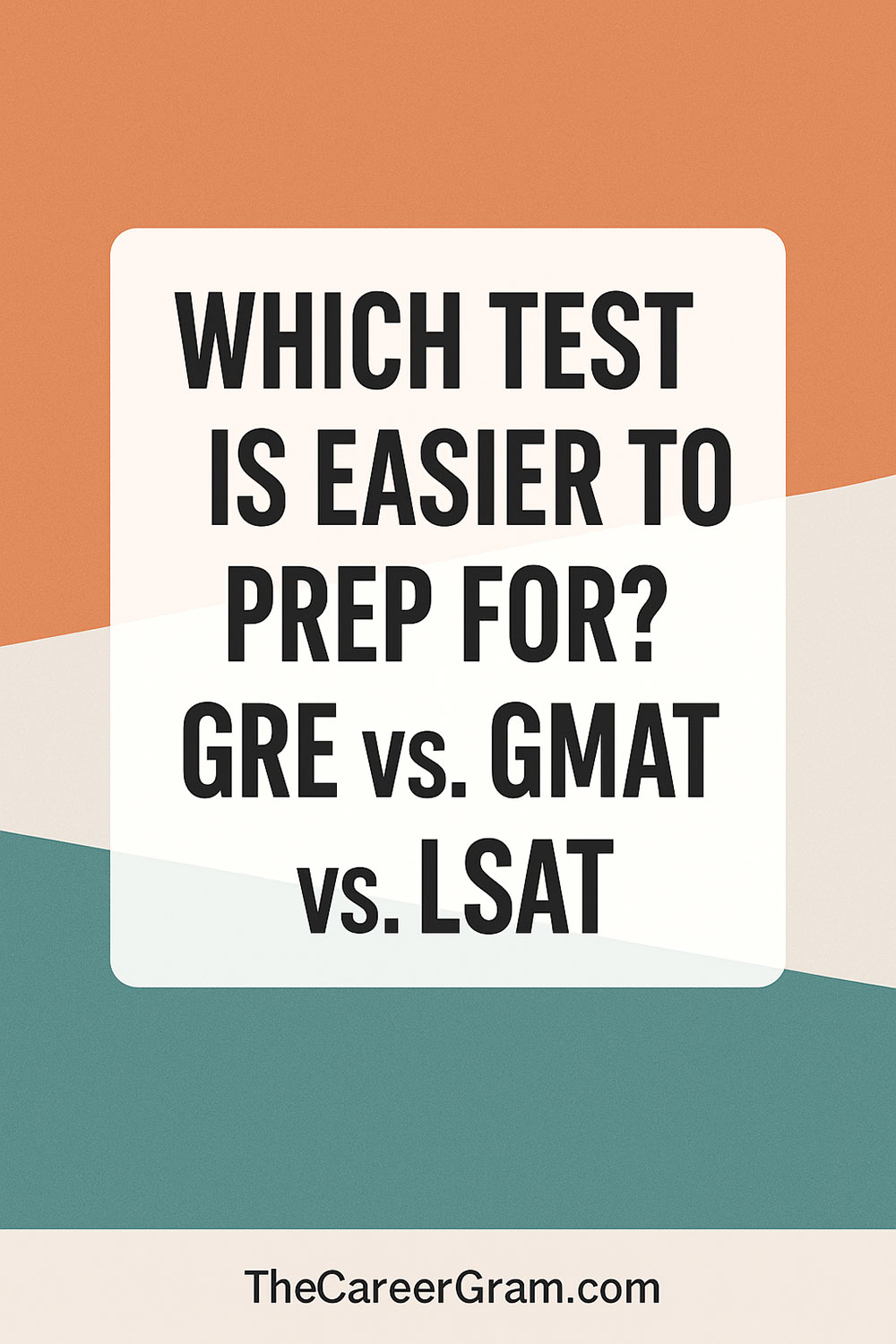When it comes to graduate school admissions, standardized tests like the GRE, GMAT, and LSAT can make a huge difference in your application. But if you’re wondering which test is easier to prep for, the answer depends on several factors: your academic background, career goals, and personal skills.
In this guide, we’ll break down the major differences, difficulty levels, and best strategies for prepping for the GRE vs. GMAT vs. LSAT — so you can choose the right path for you.
GRE, GMAT, and LSAT: Quick Overview
| Test | Purpose | Main Focus | Typical Applicants |
|---|---|---|---|
| GRE | Graduate school (Master’s/PhD programs) | Verbal, Quantitative, Analytical Writing | Arts, sciences, engineering, psychology, etc. |
| GMAT | Business school (MBA programs) | Quantitative Reasoning, Verbal Reasoning, Integrated Reasoning, Analytical Writing | Business, management, finance aspirants |
| LSAT | Law school admissions | Logical Reasoning, Analytical Reasoning, Reading Comprehension | Future lawyers and legal professionals |
GRE Prep: Easier for Verbal Lovers and Flexible Thinkers
The GRE tests general reasoning skills — think vocabulary, reading comprehension, and high-school level math (algebra, geometry, basic data interpretation).
Why GRE Prep Might Feel Easier:
- Familiar Material: No heavy business or legal jargon.
- Flexibility: It’s accepted by thousands of programs across disciplines.
- Study Resources: Tons of free and affordable GRE prep materials online.
- Vocab Emphasis: If you have strong reading and verbal skills, prepping for GRE Verbal can be quicker.
GRE Challenges:
- Advanced Vocabulary: Requires memorizing obscure words.
- Quant Section: Can trip up humanities majors or those rusty with math.
✅ Best for: Students comfortable with reading comprehension and basic math.
GMAT Prep: Easier for Quant Pros and Business-Minded Test Takers
The GMAT is the golden standard for MBA applicants, with a heavy emphasis on problem-solving, critical reasoning, and data interpretation.
Why GMAT Prep Might Feel Easier:
- Predictable Question Types: Once you master strategies, many question patterns repeat.
- Quantitative Focus: Good news for math lovers — strong quant skills give a big advantage.
- Business Logic: If you think in structured, analytical ways, you’ll adapt well.
GMAT Challenges:
- Time Pressure: GMAT is very strict on timing per question.
- Data Sufficiency: A unique question type many find confusing at first.
- Higher Quant Difficulty: Generally considered tougher than GRE quant.
✅ Best for: Math-strong, business-focused candidates who think logically under pressure.
LSAT Prep: Easier for Analytical Thinkers and Logic Enthusiasts
The LSAT is designed to test logical reasoning, critical reading, and analytical problem-solving — not general knowledge.
Why LSAT Prep Might Feel Easier:
- No Math: Unlike GRE and GMAT, no math is required.
- Skill-Based: Prepping is about improving skills, not memorizing formulas or facts.
- Predictable Patterns: Once you learn how LSAT questions work, improvement is systematic.
LSAT Challenges:
- Steep Learning Curve: Logical reasoning and games can be hard for beginners.
- Reading Intensity: Passages are long and often dense.
- Requires Stamina: You must maintain deep focus for hours.
✅ Best for: People with strong reading skills and an aptitude for logical analysis.
Which Test Is “Easier” for You? It Depends on Your Strengths!
| If you are strong in… | You might find … easier |
|---|---|
| Vocabulary and reading comprehension | GRE |
| Logical problem solving and quant | GMAT |
| Analytical thinking and logical puzzles | LSAT |
Other Factors to Consider:
- Career Goals: MBA? GMAT. Law school? LSAT. General grad school? GRE.
- Math Comfort: Hate math? Avoid GMAT.
- Test Strategy Style: Prefer skill development? LSAT. Prefer strategic guessing? GRE.
Expert Tips for Easier Prep (No Matter Which Test!)
- Take a diagnostic test first: See where you naturally perform best.
- Focus on your weak areas early: Don’t just practice what you’re good at.
- Invest in quality prep materials: Official guides and practice tests are worth it.
- Build stamina: All these tests are 3+ hours long. Practice full-length tests weekly.
- Start early: Ideally, give yourself 3–6 months to prepare without cramming.
Final Thoughts: There’s No Universal “Easier” Test
Each test plays to different strengths.
👉 If you’re a strong reader and writer, the GRE might feel the easiest.
👉 If you love logic and math, the GMAT could be your best bet.
👉 If you’re naturally analytical and detail-oriented, the LSAT might feel most natural.
Pick the test that aligns with your career goals — and your natural talents — and you’ll make your prep journey much smoother.
Mini Checklist: Which Test Should You Take?
✅ I am applying to…
- General graduate school programs (MA, MS, PhD) → GRE
- Business school / MBA program → GMAT
- Law school → LSAT
✅ My strengths are…
- Strong vocabulary and reading comprehension → GRE
- Strong logical and quantitative problem solving → GMAT
- Strong logical reasoning and analytical thinking → LSAT
✅ How I feel about math…
- Comfortable with basic math and algebra → GRE
- Good with advanced math and data interpretation → GMAT
- Prefer no math at all → LSAT
✅ My ideal prep style is…
- Memorizing vocabulary + basic math practice → GRE
- Practicing strategic problem-solving under time pressure → GMAT
- Mastering logical patterns and reading dense texts → LSAT
✅ Preferred exam strategy…
- Balanced reading and quant skills → GRE
- Excel under fast-paced quantitative problem solving → GMAT
- Skilled at analyzing arguments and logic games → LSAT
🔎 Result: Whichever column you check the most points under is likely the best exam for you to focus your preparation on!
📌 Bonus Tip:
👉 Always take a diagnostic practice test of each exam first if you’re still unsure — it will give you real insight into what feels most natural!
Save/Share/Pin





